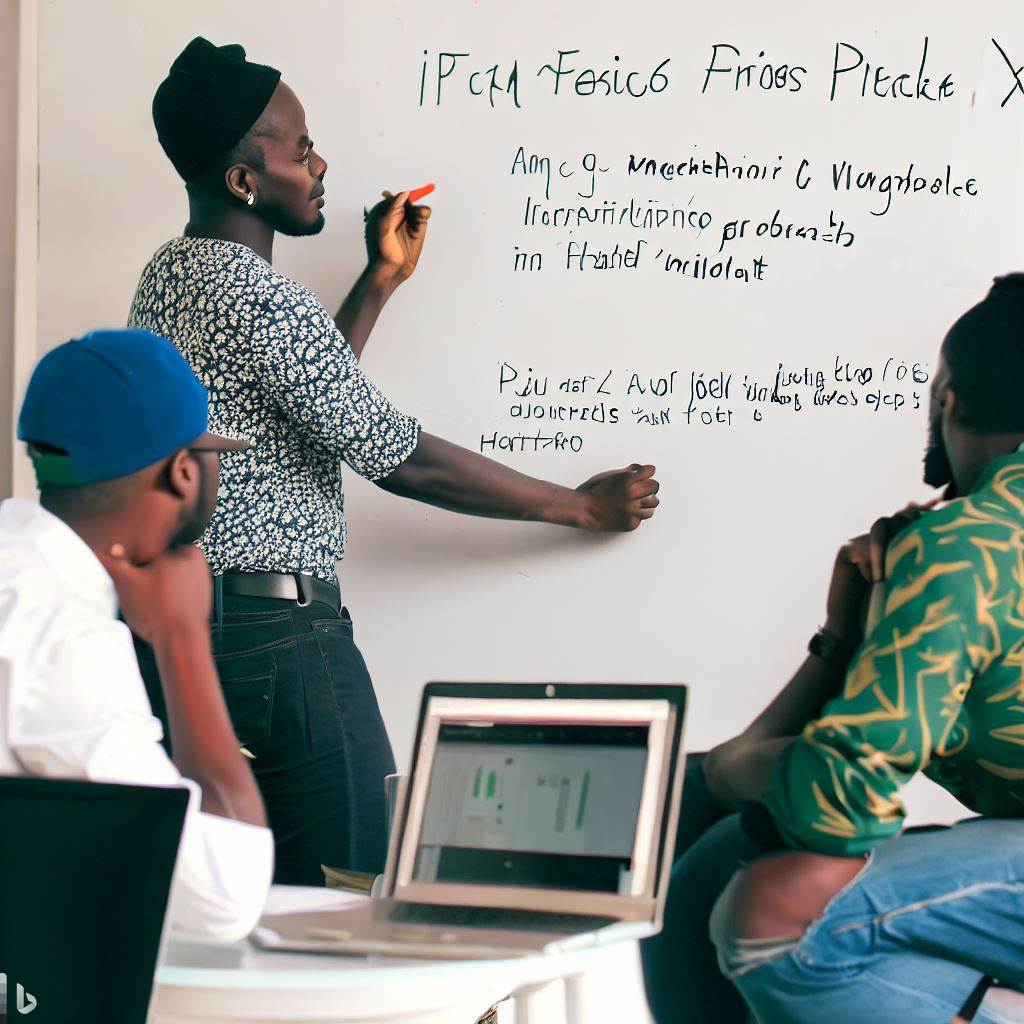Introduction
Proposals are essential in the freelance industry as they act as an introduction to potential clients. They are documents that showcase a freelancer’s skills and capabilities in a specific project.
Proposals serve as a freelancer’s foot in the door, helping them secure long-term and sustainable clients.
A proposal should be well-written and clearly articulate the freelancer’s expertise, experience, and understanding of the client’s needs.
The purpose of this blog post is to provide Nigerian freelancers with tips and strategies on how to write winning proposals. These proposals will be tailored to project-specific requirements and give freelancers an edge over their competition.
We will provide a comprehensive guide on how to write proposals, including identifying the client’s needs, drafting an effective introduction, highlighting relevant experience, and showcasing a freelancer’s value proposition.
Ultimately, the aim of this blog post is to help Nigerian freelancers succeed in their profession by increasing their chances of securing clients who value their expertise.
With the tips and strategies shared in this guide, freelancers can craft winning proposals confidently and ensure long-term sustainable work.
Understanding the Client
Understanding the Client is one of the crucial steps to winning proposals as a freelancer. Researching and understanding the client’s needs is paramount. Don’t assume you already know what they want.
Identifying the client’s pain points, those specific challenges they face, is crucial to crafting proposals. These pain points present opportunities for you to propose unique solutions to their problems.
Tailoring proposals for individual clients is a must. Every client is different, and one size doesn’t fit all. Your proposals should reflect the specific needs of the client you’re targeting.
To research and understand the client’s needs, you can start by visiting their website and social media pages. Read their About Us page, learn about their products or services, and read through their blog posts. It’s also essential to research their industry and their competitors.
Identifying a client’s pain points requires asking the right questions during client briefings. Ask open-ended questions that invite conversation and offer insights.
Once you understand clients’ struggles, you can propose specific solutions to their problems.
Tailoring proposals for individual clients involves creating custom proposals for each client, using the same template and changing the content.
Personalize your proposals by including the client’s name and addressing their specific needs and pain points.
Using HTML tags for your proposals can help make them more organized, appealing, and easier to read. Important points can be bolded, underlined, or italicized. Also, avoid imitating other proposals from other freelancers, utilize creativity.
In general, understanding the client is the foundation of winning proposals.
Researching and understanding the client’s needs, identifying their pain points, and tailoring proposals for individual clients is paramount.
Doing this will help you to not only win proposals but build lasting relationships with clients and get more consistent work.
Read: Unlocking Success: A Nigerian Freelancer’s Proposal Guide
Crafting a Winning Proposal
As a Nigerian freelancer, crafting a winning proposal is crucial to your success in securing clients and projects.
A proposal is a document that outlines your understanding of a client’s needs, your approach to addressing those needs, and the expected scope of work and budget.
Let’s explore the components of a winning proposal, tips for writing a proposal that stands out and examples of successful proposals and what made them successful.
Components of a Winning Proposal
A winning proposal consists of several key components:
- Title Page: This should include the project title, your name, and your contact information.
- Executive Summary: This should summarize the project, your understanding of the client’s needs, your proposed approach, and the expected outcomes.
- Scope of Work: This should outline the specific tasks and deliverables that you will provide as part of the project. This section should be detailed, yet concise.
- Costs and Timeline: This should include a detailed breakdown of the costs associated with the project, including your hourly rate, any additional expenses (e.g. software or equipment), and the expected timeline for completion.
- Qualifications and Experience: This section should highlight your relevant qualifications and experience that make you the right choice for the project.
- References: This section should include references from previous clients or projects that demonstrate your expertise and successful track record.
- Appendices: This section should include any additional materials, such as samples of your work or relevant certifications, that support your proposal.
Tips for Writing a Proposal That Stands Out
Now that you know the key components of a winning proposal, here are some tips for making your proposal stand out:
- Understand the Client: Before writing your proposal, make sure you understand the client’s needs and expectations. Research the organization and the industry to better understand the context of the project.
- Be Specific: Use concrete language and provide specific details about the tasks and deliverables that you will provide as part of the project.
- Provide a Unique Approach: Demonstrate your creativity and innovative approach to solving the client’s problem.
- Proofread: Grammatical errors and typos can be distracting and may make it difficult for the client to take your proposal seriously. Make sure to proofread your proposal carefully.
- Use Visuals: Including charts, graphs, and other visuals can help to illustrate your proposed approach and make your proposal more engaging.
Examples of Successful Proposals and What Made Them Successful
Here are some examples of successful proposals and what made them stand out:
- Example 1: This proposal stood out because the freelancer took the time to research the client’s organization, industry, and competitors. The proposal demonstrated a deep understanding of the client’s needs and provided a unique approach to solving the problem.
- Example 2: This proposal stood out because it was well-organized and included visuals to help illustrate the proposed approach. The costs and timeline were clearly outlined, and the proposal demonstrated the freelancer’s relevant experience and qualifications.
- Example 3: This proposal stood out because it provided a detailed breakdown of the project scope and deliverables. The freelancer also included a set of references from previous clients that demonstrated a successful track record in similar projects.
By following these tips and including the key components of a winning proposal, you can increase your chances of securing clients and winning projects as a Nigerian freelancer.
Read: Client Pitch: Making It Count in Nigeria’s Freelance Scene

Setting the Right Price for Your Proposals
As a Nigerian freelancer, it can be challenging to determine how much to charge for your services. However, setting the right price is crucial to ensure that your proposals win and that you earn a fair income.
Here are some strategies for pricing proposals that will help you determine the value of your work and negotiate rates with clients effectively:
Determine Your Hourly Rate
One of the most common strategies for pricing proposals is to determine your hourly rate.
Calculate the amount of time it takes you to complete a task, add any necessary expenses, and divide the total by the number of hours worked. This figure will give you a rough idea of your hourly rate.
Research Market Rates
Another effective strategy for pricing proposals is to research market rates to determine what other freelancers and competitors in your niche are charging.
You can use online resources, such as freelance marketplaces, to get a general estimate of the going rate for similar services.
Consider Your Unique Value Proposition
It’s essential to consider your unique value proposition when pricing proposals. The value of your work is determined by the quality and expertise you provide, as well as the results you deliver.
If you offer highly specialized services or have a unique skill set, you can charge a premium for your work.
Be Transparent About Your Pricing
Transparency is also crucial when it comes to pricing proposals.
Be upfront about your rates, and explain the breakdown of costs to clients. This will help establish trust and ensure that the client understands the value of your work.
Negotiate Rates with Clients
Negotiating rates can be nerve-wracking for many freelancers, but it’s an important part of the proposal process.
Keep in mind that negotiation is a two-way street, and both parties should feel comfortable with the final price. Be prepared to explain your rates and why they are fair, but also be open to compromise if necessary.
Consider Alternative Payment Structures
Finally, consider alternative payment structures when pricing proposals. Some clients may prefer to pay a fixed fee for a project, while others may prefer an hourly or retainer-based payment structure.
Offering flexible payment options can make your proposals more appealing to a broader range of clients.
In fact, setting the right price for your proposals is essential for winning jobs and earning a fair income.
By using the strategies outlined above, you can determine the value of your work, research market rates, be transparent about your pricing, negotiate rates with clients, and offer alternative payment structures that meet their needs.
Read: Pitching for Success: Freelancing Tips from Nigerian Pros
Communicating Effectively
In order to win proposals as a Nigerian freelancer, effective communication is key. Here are some tips to help you communicate your ideas and solutions clearly and concisely:
- Keep it Simple: Avoid industry jargon or complex technical terms that may confuse your clients. Use simple language and get straight to the point.
- Use the Right Tone: Your tone should match the client’s preferences. Use a formal tone for business proposals and a more friendly, conversational tone for projects related to creative industries.
- Address the Problem: Start by addressing the client’s needs and highlighting the problem you aim to solve. This helps to capture the client’s attention and shows them that you understand their needs.
- Present Your Ideas: Explain how your solution will solve their problem and present your ideas in a clear, concise manner. Use bullet points or numbered lists to make it easier to follow.
- Incorporate Visuals: Use visuals such as infographics, charts, and images to enhance your proposal and make it more engaging. Visuals make it easier for clients to understand complex concepts.
- Highlight Your Experience: Share your past experiences that may be relevant to the project. This helps to build trust and credibility with the client.
- Address Potential Concerns: Address any potential concerns the client may have about your proposal. Provide solutions or suggestions to address these concerns.
- Provide Follow-Up Options: Provide options for the client to follow up with you, such as phone calls or emails. This shows that you value their feedback and are open to communication.
Essentially, clear and concise communication is crucial when it comes to winning proposals as a Nigerian freelancer.
Follow these tips to effectively communicate your ideas and solutions, and enhance your proposals with visuals to make them engaging and easy to understand.
By doing this, you’ll increase your chances of winning proposals and building long-term relationships with clients.
Read: Leveraging the Power of Proposals in Nigeria’s Gig Economy
Following Up and Closing the Deal
Following up After Submitting a Proposal
- Send a follow-up email or message after a few days of submitting your proposal.
- Ask if they have any questions or concerns about your proposal.
- Provide additional information or clarification if necessary.
- Express your continued interest in working with them.
Strategies for Closing the Deal with Potential Clients
- Emphasize the benefits of working with you and the value you can provide.
- Offer a discount or incentive to seal the deal.
- Address any concerns or objections they may have.
- Show confidence in your abilities and willingness to work with them.
Handling Rejections and Turning them Into Opportunities for Improvement
- Thank them for considering your proposal and ask for feedback on why you were not chosen.
- Use their feedback to improve your proposals and future pitches.
- Keep in touch with them and continue to provide value to build a relationship.
- Stay positive and continue to look for new opportunities.
Read: Nigeria Freelance: Turn Prospects into Clients with Pitching
Conclusion
Winning proposals need not be rocket science for Nigerian freelancers. It involves following basic steps – understand the client’s needs, personalize the proposal to fit the client’s requirements, and use the right tone.
Besides, Nigerian freelancers need to focus on establishing trust, showing value for money, and creating a sense of urgency without sounding desperate. Always ensure to proofread the document multiple times before submission to avoid errors.
It’s essential to implement the strategies suggested in this blog post and adapt them to personal style, thereby making it unique to stand out among the competition.
Remember, there’s always room for improvement; keep refining your proposals to suit each client specifically.
Lastly, Nigerian freelancers should take the call to action by throwing their hats in the ring and strive to win more proposals. Rejection should not deter the pursuit of success.
Keep pushing and putting in the effort, and eventually, the perfect proposal will present itself, and the client would say ‘Yes.’
Winning proposals do not come pre-packaged; instead, it’s a product of thorough research, careful crafting, and excellent communication. Aspiring freelancers should learn these basic principles and apply them to be successful.




